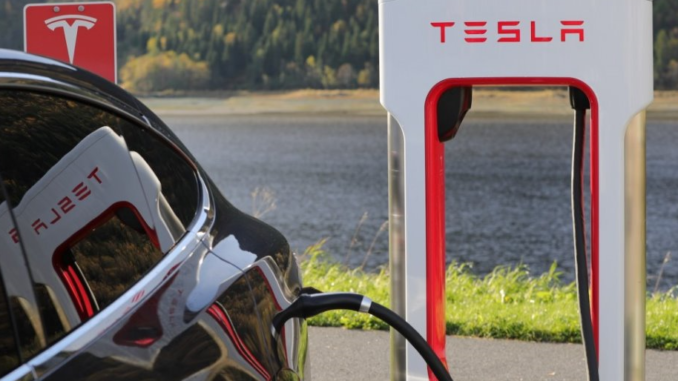
There’s less than 200 electric vehicles registered in the state of North Dakota. According to an article in the Bismarck Tribune last month, we rank “near last in the nation for adoption of electric cars and buildout of charging infrastructure.” It’s a reality that Linda Sitz, strategic innovation manager with the North Dakota Department of Transportation, isn’t happy about. She told the Tribune:
“That is not something that we want to be known for.”
And she’s serious about it too. Last week she told KFYR that:
“With the group that we’re working with, everyone is excited to bring electric cars in the state of North Dakota. We want to be progressive; we want to be known as a progressive state, so part of that is getting these charging stations established.”
Apparently it’s the electric car version of, “If you build it, they will come.” Which is fine. I’m not opposed to electric vehicles— though I have no desire to own one myself. But who will pay for the infrastructure to install these “progressive” charging stations? Well, taxpayers— of course. At least in part.
And what’s the justification for it? According to the aforementioned Tribune article, the state is missing out “on potential tourism and economic development dollars.” A predictable answer if there ever was one. Can you imagine the amount of taxpayer dollars doled out in the name of “tourism and economic development” in this state?
What’s somewhat amusing is the source of the claims, which came from “several electric vehicle drivers, utility representatives and state officials who gathered [in Bismarck] for a discussion about the cars.” The event was hosted by “Drive Electric North Dakota, a newly formed group of electric vehicle advocates led by the Lignite Energy Council.”
And yes, that’s the same Lignite Energy Council whose “primary objective… is to maintain a viable lignite coal industry and enhance development of the region’s lignite coal resources for use in generating electricity, synthetic natural gas and valuable byproducts.”
It’s a typical special interest lobbying effort if there ever was one.
It’s really not surprising though. Back in April, the North Dakota Legislature passed Senate Bill 2061. Aside from establishing fees related to electric vehicles and motorcycles, this bill also included a study to be carried out during the 2019-2020 interim that would look into:
“… current methods, using the electric vehicle infrastructure coalition, led by the department of transportation, to collaborate with the North Dakota utility industry, and North Dakota electric vehicle stakeholder groups, to design a jointly owned public and private network of electric vehicle infrastructure to support both commercial and noncommercial vehicles and make recommendations regarding electric vehicle charging infrastructure. The study must include the evaluation of the relative costs and benefits associated with various options for electric vehicle infrastructure support and estimate the future annual economic impact. The legislative management shall report its findings and recommendations, together with any legislation necessary to implement the recommendations, to the sixty-seventh legislative assembly.” (Emphasis Added)
That study was indeed selected for the interim and was assigned to the Agriculture and Transportation Committee. They had their first meeting a week ago. We’re waiting for the minutes to be published on-line.
As you can see here and here, there are currently about 30 charging stations in North Dakota. How fast a car charges ranges anywhere from 30 minutes to 12 hours— depending on the car and type of charging station.
A Level 3 charger — which is the faster charge — is particularly spendy. They run about $50,000. And apparently North Dakota doesn’t have any of them. Between an overall shortage of stations and a lack of Level 3 chargers, a trip from Minneapolis to Seattle through North Dakota could take about nine days. But why should this be the taxpayers’ problem?
If adding these electric vehicle charging stations is so vitally important to local economies across the state, then why don’t private businesses themselves band together to install them? After all, if the need is so great — and would be such a significant draw — then you’d think they’d benefit by doing so. But why do that when you can partner with the government to extract some funding from the taxpaying public to accomplish the same thing?
What we have here is yet another example of our state government meddling in things it shouldn’t be. If there’s a demand for electric vehicle charging stations in North Dakota, then let the free market take care of it.
PLEASE LIKE AND SHARE!
Sources:
- https://bismarcktribune.com/news/state-and-regional/electric-vehicle-advocates-say-north-dakota-loses-out-on-tourism/article_d23819f9-e580-5596-aaac-ab5d0968ee81.html
- https://www.kfyrtv.com/content/news/ND-DOT-to-expand-electric-charging-stations-562216291.html
- http://www.driveelectricnd.com/
- https://lignite.com/about-us/
- https://www.legis.nd.gov/assembly/66-2019/bill-actions/ba2061.html
- https://www.legis.nd.gov/assembly/66-2019/committees/interim/agriculture-and-transportation-committee
- https://chargehub.com/en/countries/united-states/north-dakota.html
- http://www.driveelectricnd.com/map-of-charging-stations/
- https://pod-point.com/guides/driver/how-long-to-charge-an-electric-car
- https://www.eenews.net/roadtrip/1061023493


